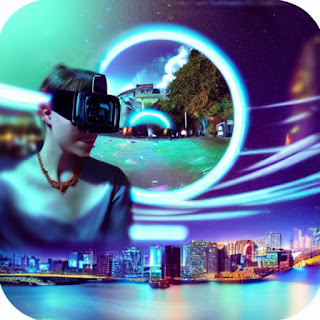Future of Travel in 2023 and How it's Going to Affect Your Life
Future of Travel in 2023, It is difficult to predict with certainty what the future of travel will be like in 2023, as it will depend on a variety of factors such as technological advancements, economic conditions, and public health considerations. However, it is possible that virtual and augmented reality tourism may become more prevalent in the coming years.
Virtual reality (VR) technology allows users to experience immersive, computer-generated environments and can be used to create virtual tours of destinations or to simulate travel experiences. Augmented reality (AR) involves overlaying digital information on the real world, and can be used to enhance the travel experience by providing information about a destination or offering interactive experiences.
It is also possible that the use of technology to enhance the travel experience will continue to grow, such as through the use of artificial intelligence to personalize travel recommendations or through the use of robotics to automate certain tasks.
Regardless of the specific technological developments that may emerge in the future, it is likely that the travel industry will continue to evolve and adapt to changing circumstances.
How Game-Changing Technologies are Evolving the Future of Travel
There are several game-changing technologies that are already having an impact on the travel industry and are likely to continue to shape the future of travel. These technologies include:
Virtual and augmented reality: As mentioned earlier, VR and AR technologies are being used to create immersive, digital travel experiences and to enhance the real-world travel experience.
Artificial intelligence: AI is being used to personalize travel recommendations, to automate certain tasks, and to improve the efficiency of various processes within the travel industry.
Robotics: Robotics are being used to automate tasks such as baggage handling and check-in processes, which can improve efficiency and reduce the need for human labor.
Blockchain: Blockchain technology is being used to improve the security and transparency of various travel-related transactions, such as hotel bookings and flight reservations.
Internet of Things (IoT): The IoT refers to the interconnected network of devices that can communicate with each other and with the internet. In the travel industry, the IoT is being used to improve the customer experience by providing real-time information and personalized recommendations.
Overall, these technologies are helping to make the travel experience more convenient, efficient, and personalized.
The Future of Tourism Development and its Implications for Travelers
There are several trends that are shaping the future of tourism development and that are likely to have implications for travelers. These trends include:
Sustainability: There is an increasing focus on sustainable tourism development, which aims to minimize the negative impacts of tourism on the environment, culture, and local communities. This may involve promoting eco-friendly practices such as reducing waste, conserving resources, and protecting natural habitats.
Digital transformation: The increasing use of technology in the travel industry is likely to continue to shape the way tourists experience destinations. This may involve the use of virtual and augmented reality, artificial intelligence, and other technologies to enhance the travel experience.
Personalization: The use of data and technology is making it possible for the travel industry to offer more personalized experiences to travelers. This may involve using AI to make recommendations based on an individual's preferences or using the IoT to provide real-time information and recommendations.
Experience economy: There is a growing trend towards offering unique and experiential travel options, rather than simply offering traditional accommodation and transportation. This may involve offering activities such as adventure sports, cultural experiences, or wellness retreats.
Overall, these trends are likely to continue to shape the way travelers experience destinations in the future, and may lead to more sustainable, personalized, and experiential travel options.
Some Scary Facts about Air Pollution and its Effects on our Future Inhabitants
Here are some scary facts about air pollution and its effects on our future inhabitants:
Air pollution is the single largest environmental health risk globally, responsible for more than 7 million premature deaths each year.
Air pollution is linked to a range of negative health outcomes, including respiratory and cardiovascular disease, stroke, and cancer.
Children, older adults, and people with pre-existing health conditions are particularly vulnerable to the negative health impacts of air pollution.
Air pollution can also have negative impacts on the environment, including damaging crops, forests, and bodies of water.
The main sources of air pollution are burning fossil fuels for energy, transportation, and industrial processes, as well as agriculture and waste management practices.
If current trends continue, the World Health Organization estimates that by 2050, air pollution will be the leading cause of death globally.
It is important to take action to reduce air pollution in order to protect the health and well-being of current and future generations. This may involve transitioning to cleaner forms of energy, implementing policies to reduce emissions from transportation and industry, and promoting sustainable agriculture and waste management practices.
Is Climate Change Our Only Obstacle on the Road to a Cleaner Planet?
While climate change is a significant obstacle on the road to a cleaner planet, it is not the only one. Other environmental challenges include:
Air pollution: As mentioned earlier, air pollution is a major environmental health risk, causing millions of premature deaths each year and damaging the environment.
Water pollution: Water pollution can have negative impacts on human health and the environment, including causing illness, killing aquatic life, and contaminating food sources.
Land degradation: Land degradation refers to the loss of productivity and fertility of the soil, which can be caused by factors such as overuse, pollution, and climate change. Land degradation can have negative impacts on food production and the environment.
Biodiversity loss: The loss of biodiversity, or the variety of plant and animal life, can have negative impacts on ecosystems and the services they provide, such as pollination and water purification.
Overconsumption and waste: The overconsumption of resources and the production of excess waste can contribute to environmental degradation and resource depletion.
Addressing these environmental challenges will require a range of solutions, including transitioning to cleaner forms of energy, implementing policies to reduce pollution and protect natural resources, and promoting sustainable practices.


Post a Comment for "Future of Travel in 2023 and How it's Going to Affect Your Life"